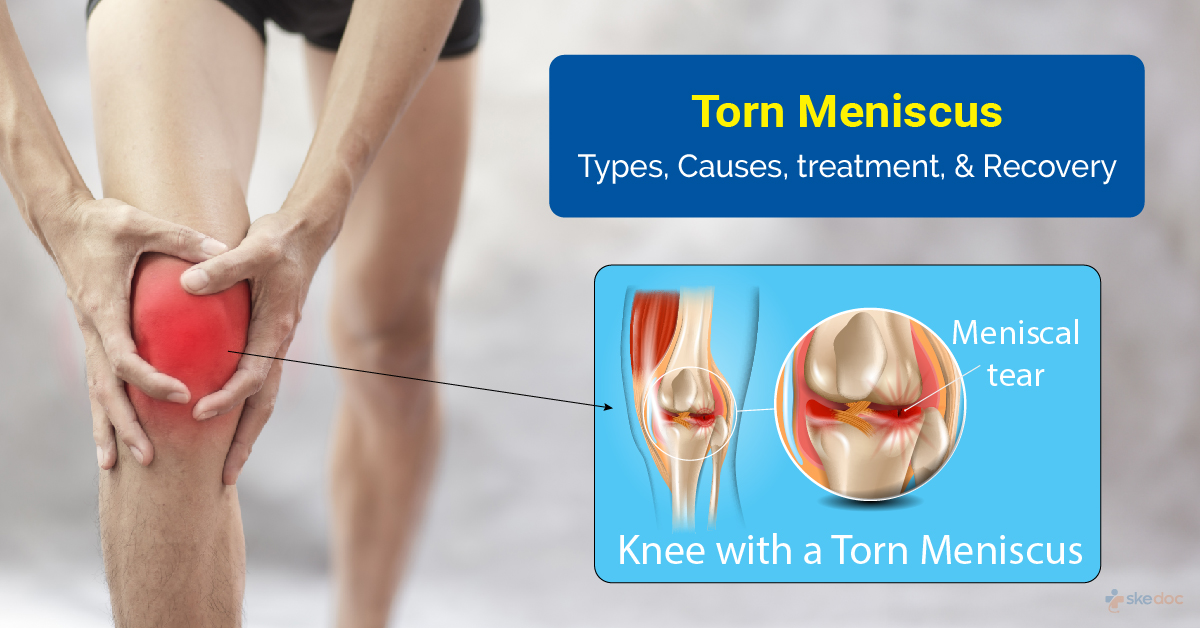Allergy
Blood Diseases
Bone & Joints
Brain
Cancer
Child Care
Cosmetic Surgery
Diabetes
Endocrinology
ENT
Eye
Gen Medicine
General Surgery
Heart
Kidney
Lifestyle
Liver & Digestive
Lung
Men’s Health
Mental health
Physiotherapy
Rheumatology
Skin and hair
Sleep Disorders
Spine
Transplant
Women Health
Thyroid
Vascular Surgery
Torn Meniscus Overview

Overview
The meniscus is a C-shaped cartilage that is situated within the knee, between the thighbone (femur) and the shinbone (tibia). The meniscus acts as a wedge-shaped rubbery cartilage that acts as a shock absorber for the knee joint.
A meniscus tear is one of the most common cartilage injuries in the knee. It can occur in any age group.
Causes
Meniscus tear is often caused by sudden motion during which the knee twists or rotation of the knee while the foot is placed on the ground. It is most often caused while playing sports, which include football, tennis, soccer, and tennis.
It can also be caused by deep squatting, heavy lifting, sudden pivot, or turning, which can result in injury to the meniscus cartilage.
Risk factors
The risk factors that are associated with meniscus tears include:
- Age- it can affect people of any age group. However, the incidence is most common in young adults and old age groups.
- Obesity
- Daily routine activities, such as walking and climbing stairs, increase the potential to cause wearing, degeneration, and tearing of the meniscus cartilage.
- In a few cases, it can be caused by an unknown etiology (idiopathic cause)
- Trauma to the knee
Symptoms
The signs and symptoms that are associated with meniscus tear include:
- Swelling or stiffness of the knee joint
- Popping sensation
- Pain persists while twisting or rotating the knee
- Difficulty in straightening and bending the knee
- Limit mobility
- Knee instability
- Catching or clicking sensation while walking
Diagnosis of meniscus tear
Whenever the patient finds any kind of abnormalities in the knee or notices any of the above mentioned symptoms, one should consult the orthopedic surgeon immediately. The doctor will perform a couple of tests to confirm the diagnosis. They include:
- Physical examination- During the physical examination, the doctor will examine the patient thoroughly. The doctor will lift the knee and leg into different positions and look for any kind of abnormalities. To confirm the cause, the doctor will advise the patient to undergo a couple of tests,
- Mc Murray test- It is considered to be one of the classic tests, which is used to assess for meniscus damage.
- X-ray of the knee- The X-ray scan will help to rule out any other conditions that might show similar symptoms.
- MRI scan- MRI scan will help us to evaluate and examine both hard and soft tissues of the knee. It is considered to be the diagnosis of choice for a meniscus tear.
- Arthroscopy
Treatment for meniscus tear
The treatment plan for a meniscus tear depends upon various factors, which include the age of the patient, their associated co-morbidities, the severity of the condition, and the overall condition of the patient. The treatment plan includes:
- Initial treatment plan: It includes RICE protocol.
- R: Rest with modified activity
- I: Apply ice or a cold pack for a duration of 15-20minutes at a regular time interval during the day
- C: Compress the knee with the help of a brace or knee sleeve to prevent swelling to the knee
- E: Elevate the leg while resting or relaxing.
- Medications- They include painkillers such as NSAIDs (non-steroidal anti-inflammatory drugs), naproxen, and ibuprofen, other medications include steroid injection (cortisone), which will help in minimizing inflammation and ease pain.
- Physiotherapy- It will help in strengthening and providing stability to the muscles around the knee and the leg.
- Surgical methods- The surgical treatment plan is usually recommended in conditions when the patient does not respond to the above-mentioned treatment plan. There are three types of surgeries available to treat meniscus tear. They include:
- Arthroscopic meniscectomy- During this procedure, the damaged portion of the meniscus is removed.
- Meniscus repair- As the name suggests, during this procedure, the damaged portion of the meniscus is repaired, and restores the normal anatomy of the knee.
- Meniscus transplant- During this procedure, the entire part of the meniscus is removed and replaced by a deceased donor patient.
Complications associated with meniscus tear
The complications that are associated with meniscus tears include:
- Persistent knee pain
- Development of osteoarthritis of the injured knee
- Inability to move the knee
- Nerve and blood vessel damage
- Blood clots/ deep vein thrombosis
- Ligament injuries
- Infection
- Hemarthrosis (bleeding within the joint)
- Arthrofibrosis (thick fibrous material around the knee joint)
Prognosis
Early diagnosis and treatment of meniscus tear will result in a good prognosis for the patient. The treatment of choice for the meniscus tear will depend on the location of the tear. The majority of the people will recover well and can return to normal activity at an early stage.
Prevention
Although meniscus tear cannot be prevented completely, however, there are ways by which it can be prevented to some extent. They include:
- Exercise regularly
- Reduce weight in case of obesity
- Maintain flexibility
- Warm up with light exercises before playing any game
- Give adequate rest between workouts
- Avoid abruptly increasing the intensity of workouts
- Wear the correct size of shoes that are comfortable while playing games or during workouts
Was this article helpful?
YesNo




